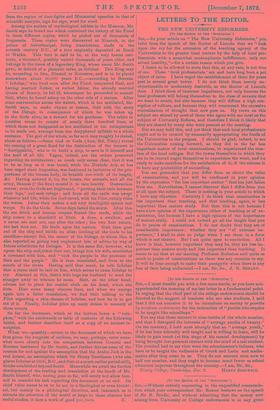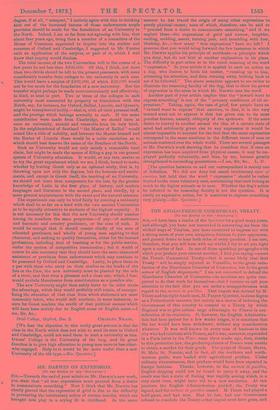[TO THE EDITOR OF THE "SPECTATOR.')
SIR,—Without entirely concurring in the unqualified commenda- tion which your correspondent Mr. Roscoe bestows on the speech of Sir B. Brodie, and without admitting that the money now arising from University or College endowments is in any great
degree, if at all, "misspent," I entirely agree with him in thinking that out of the increased income of those endowments ample provision should be made for the foundation of an University in the North. Indeed, I am so far from not agreeing with him, that about four years ago, being then a member of a committee of the House of Commons appointed to inquire into the studies and revenues of Oxford and Cambridge, I suggested to Mr. Forster such an application of the surplus, or part of it, which I well knew that inquiry would disclose.
The total income of the two Universities will in the course of a -few years be not less than £600,000. Of this, I think, not more than two-thirds should be left to the present possessors, with some considerable transfer from colleges to the university in each case.
• s This would leave a surplus of £200,000, of which 250,000 would cot be too much for the foundation of a new university. But the transfer might perhaps be made more conveniently and effectively, in kind, at least in part. Two or three of the colleges in each university most connected by property or foundation with the North, say, for instance, for Oxford, Balliol, Lincoln, and Queen's, might be transplanted bodily,—that is, with all their personal staff, and the prestige which belongs severally to each. If the same contribution were made from Cambridge, we should have at once an university, ancient and venerable from its very birth. In the neighbourhood of Scotland "the Master of Balliol" would sound like a title of nobility, and between the Master himself and the Rector of Lincoln there would be a noble emulation as to which should best deserve the name of the Boniface of the North.
Such an University would not only satisfy a reasonable local Claim, but might be made the means of filling a gap in our general system of University education. It would, at any rate, enable us to try the great experiment which we are, I think, bound to make, whether by leaving Greek only as an optional study, that is, by 'throwing open not only the degrees, but the honours and emolu- ments, and except in Greek itself, the teaching of an University, we should not more than compensate for the loss, by the greater knowledge of Latin in the first place, of history, and modern languages and literature in the second place, and thirdly, by a more general acquaintance with the exact and the natural sciences.
The experiment can only be tried fairly by creating a university -which shall be so far on a level with the two ancient Universities as to be equally attractive to students of the highest capacity. It is nut necessary for this that the new University should number among its members the same proportion—if any—of noblemen and baronets and country gentlemen, or the sons of such. It would be enough that it should consist chiefly of the sons of educated gentlemen and wholly of young men aspiring to that ,character, and seeking to qualify themselves, either for the learned professions, including that of teaching or for the public service, under the system of competitive examination ; but it would of course be also necessary that they should have the same chances of assistance or provision from endowments which may continue to be possessed by Oxford and Cambridge. Lastly, to place them on a par with those who carry on their studies on the banks of the Isis or the Cam, the new university must be planted by the side of a river, and that river a pleasant and a clean one, which, I fear, would exclude Manchester from consideration as a possible site.
The new University might then safely leave to its older rivals the advantage, which they would probably still retain, of monopo- Esing the education of that class from which statesmen are most commonly taken, who would still continue, in some instances, to cam for Greek iambics the credit of that political success which will have been mainly due to English sense or English acres.—I am, Sir, &c.,
[We fear the objection to this really great scheme is that the class in the North which does not wish to send its sons to Oxford and Cambridge, could not send them to such a university as this. Owens' College is the University of the busy, and its great function is to give high education to young men more or less other- wise engaged. Help to it would be far more useful than a new University of the old type.—En. Spectator.]



































 Previous page
Previous page